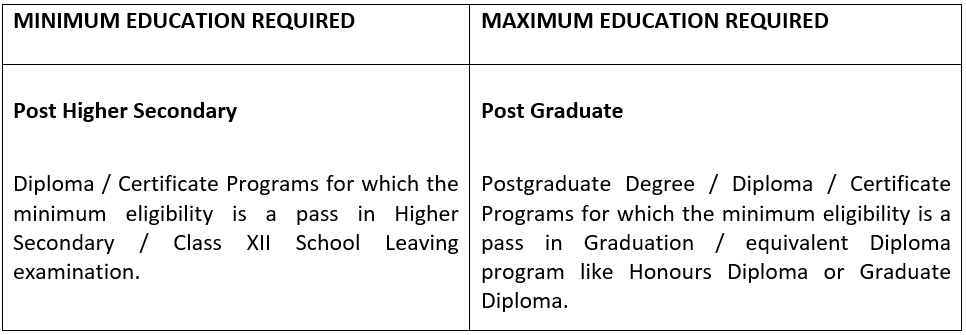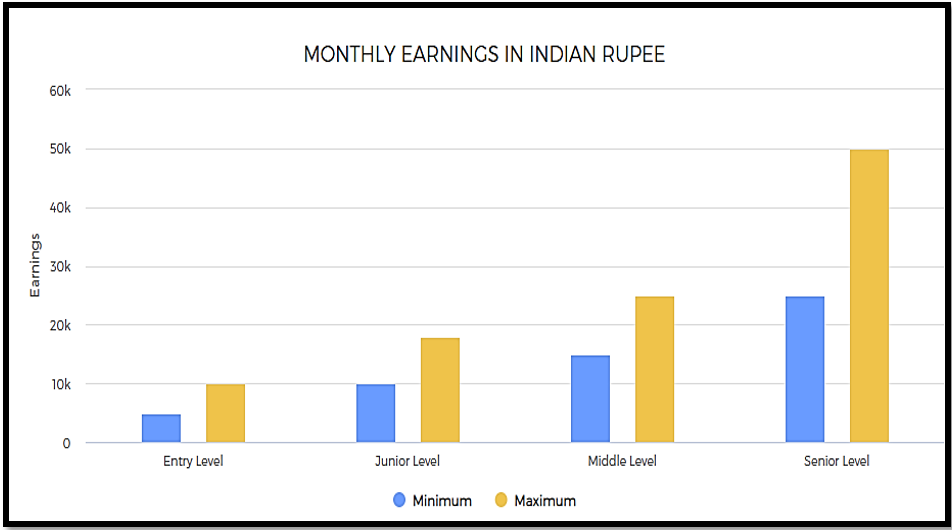GST Accounts Assistant & GST Practitioner
Entry Level Qualification
12
Career Fields
Banking & Finance
For Specially Abled







Career Entrance Exam
About Career
PARTICULARS | DESCRIPTION |
Name | GST Accounts Assistant & GST Practitioner |
Purpose | Compliance and Audit Support |
Career Field | Banking & Finance |
Required Entrance Exam | NMIMS NPAT, CUET UG |
Average Salary | 60000 - 150000 Rs. Per Year |
Companies For You | GST India Services, Wipro, Deloitte & Many More |
Who is Eligible | Class 12th Pass |
1. GST (Goods and Service Tax) is an indirect federal sales tax that is applied to the cost of most of the goods and services produced or sold in India. It is a value-added tax levied/imposed on the goods and services which are sold for domestic consumption. The meaning of value-added is that the sellers add GST to the selling prices of goods or services that they sell. So, this is value addition to the goods and services. When a customer or buyer buys the products or services, she pays the sales price plus GST. This GST amount that is collected by the sellers from the customers is paid to the government.
2. GST Practitioner and GST Accounts Assistant are not two widely different professions. The only difference between the two is that a GST Practitioner is a professional who is registered and approved to work as a GST Practitioner under an Act(to file GST return, claim benefits under GST, etc.). A GST Practitioner, on behalf of a taxable business or a seller, has to appear as an authorized representative before any officer of the GST department, appellate authority or appellate tribunal.
3. However, GST Accounts Assistant could be any person knowing GST, appointed by a company or any person for performing functions related to filing returns by the applicable due dates. He or she is not accountable for any false statement or any other questionnaire raised by any officer of the GST department, appellate authority or appellate tribunal.
In Section 2(55) of CGST (The Central Goods and Service Tax) Act, 2017 the definition of GST Practitioner states that any person who is approved to work as a GST Practitioner under Section 48 of the CGST Act, 2017 can practice as a GST Practitioner. As per Section 48 of the CGST Act, 2017, any person/tax professional who can prepare returns and perform other activities based on the information furnished to him or her by a taxable/registered person is referred to as GST Practitioner. However, as per the Act, no person is eligible to represent as a good and service tax practitioner on behalf of any registered or un-registered person before any authority in connection with any proceedings under the Act, unless he or she has been enrolled under Rule 83.
4. As a Goods & Services Tax (GST) Accounts Assistant, you will be involved in the computation of tax liabilities related to GST, filing of returns, and maintaining records of the same for audit purposes. You will be appointed for maintaining, making or preparing periodic records of accounts from time to time.
5. As a Goods & Services Tax (GST) Accounts Assistant, you will be responsible for making payment electronically of the tax liability/computed tax amount. You will be engaged in filling-up the tax return form in the prescribed format with relevant transaction details. You will be filing periodic GST Returns independently.
Key Roles and Responsibilities
1. As a Goods & Services Tax (GST) Practitioner, you will be engaged with one or more of the following roles and responsibilities on behalf of a registered/taxable person: -
2. Filing-up an application for fresh registration.
3. Filing-up an application for amendment or cancellation of registration.
4. Furnishing the details of outward and inward supplies.
5. Furnishing the monthly, quarterly, annual or final returns on behalf of the registered/taxable person.
6. Making payments for credit into the electronic cash ledger, such as payments for tax, interest, penalty, fees or any other amount.
7. Filing-up a claim or refund.
8. Appearing as an authorized representative before any officer of department, appellate authority or appellate tribunal.
As a Goods & Services Tax (GST) Accounts Assistant, you will be engaged with one or more of the following roles and responsibilities: -
1. Recognizing the applicability of Goods and Service Tax.
2. Monitoring the daily routine accounting work.
3. Filing-up the tax return form such as Form GSTR – 3B, Form GSTR – 1 & Form GSTR – 9 in the prescribed format with relevant transaction details.
4. Preparing and maintaining various transactional records in the books of accounts.
5. Identifying the types of payment, modes of payment, and rules of collection of tax.
6. Memorizing the due dates for making the payments/filing the returns.
7. Defining the difference between the TDS (Tax Deducted at Source) and TCS (Tax Collected at Source) to the company.
Career Entry Pathway
Class 10 all subjects as per scheme of studies - Class 11-12 with any subject combination as per scheme of studies – Graduate or Post Graduate or any equivalent degree in commerce, law, banking, business administration, business management – Apply for GST Practitioner exam registration by filling form GST PCT - 01
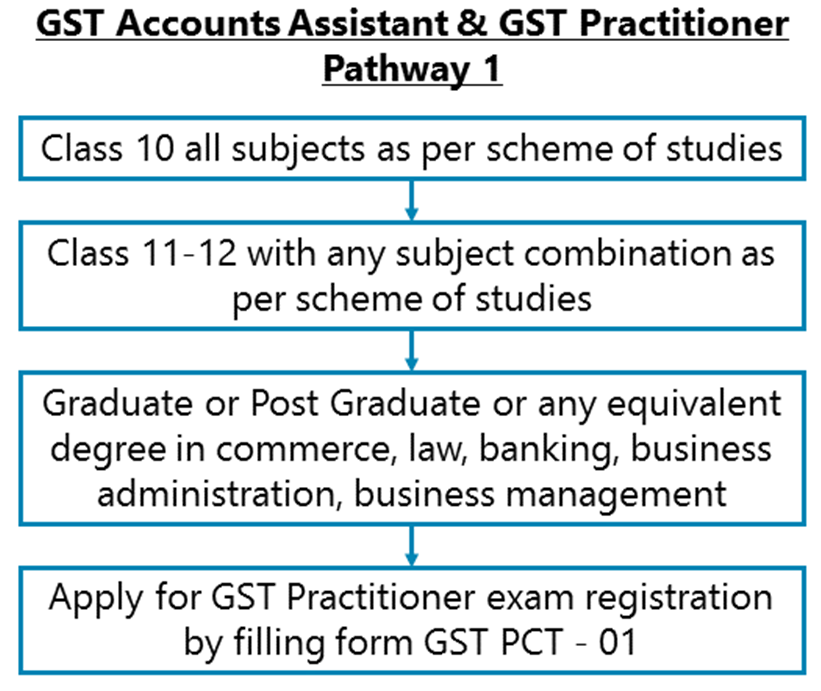
After completing Class 11-12 with any subject combination as per scheme of studies and after obtaining any Graduate or Post Graduate in commerce, law, banking, business administration, business management or any equivalent degree from any recognized Indian University which is approved by law or from a foreign university which is recognized by an Indian University, you can apply for GST Practitioner exam registration by filling form GST PCT – 01. Later on Form GST PCT - 02 which is a certificate of enrollment as a GST Practitioner is issued by an authorized officer.
Class 10 all subjects as per scheme of studies - Class 11-12 with any subject combination as per scheme of studies – Graduation in Commerce or allied subject – Obtain NSQF Level 4 Qualification in Goods & Services Tax (GST) Accounts Assistant.
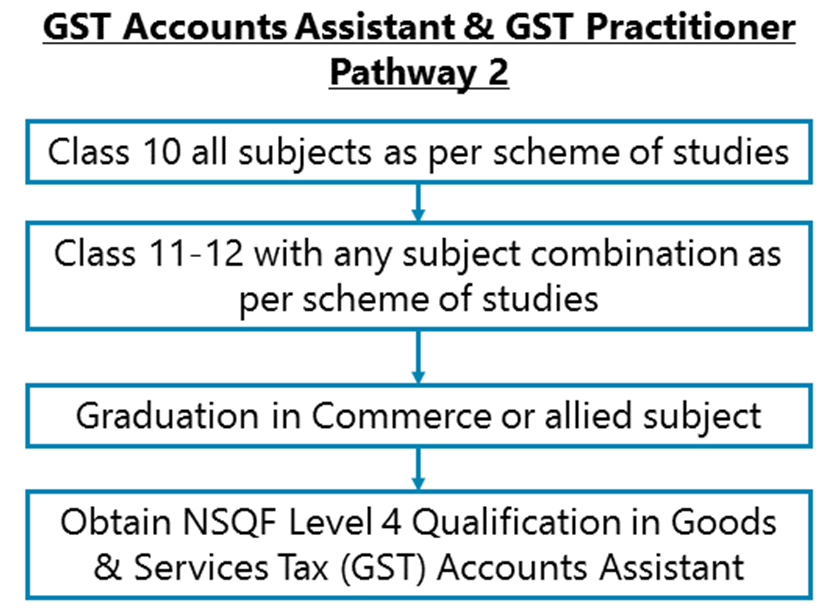
After completing Class 11-12 with any subject combination as per scheme of studies, you can apply for any Gradation course in commerce or allied subject such as B.Com, B.Com (Hons.), BBA, BCA, B.A (Economics), etc. Then you may obtain NSQF (National Skills Qualification Framework) Level 4 qualification in Goods & Services Tax (GST) Accounts Assistant. You need to be 21 years of age for obtaining this NSQF Level qualification certificate. This NSQF Level 4 qualification training in GST Accounts Assistant is of 100hours of duration (i.e., 53 hours for Theoretical training + 47 hours of Practical Training).
Class 10 all subjects as per scheme of studies - Class 11-12 with any subject combination as per scheme of studies – Graduation in Commerce or allied subject – Post Graduation degree in Commerce or similar related field - Obtain NSQF Level 4 Qualification in Goods & Services Tax (GST) Accounts Assistant.
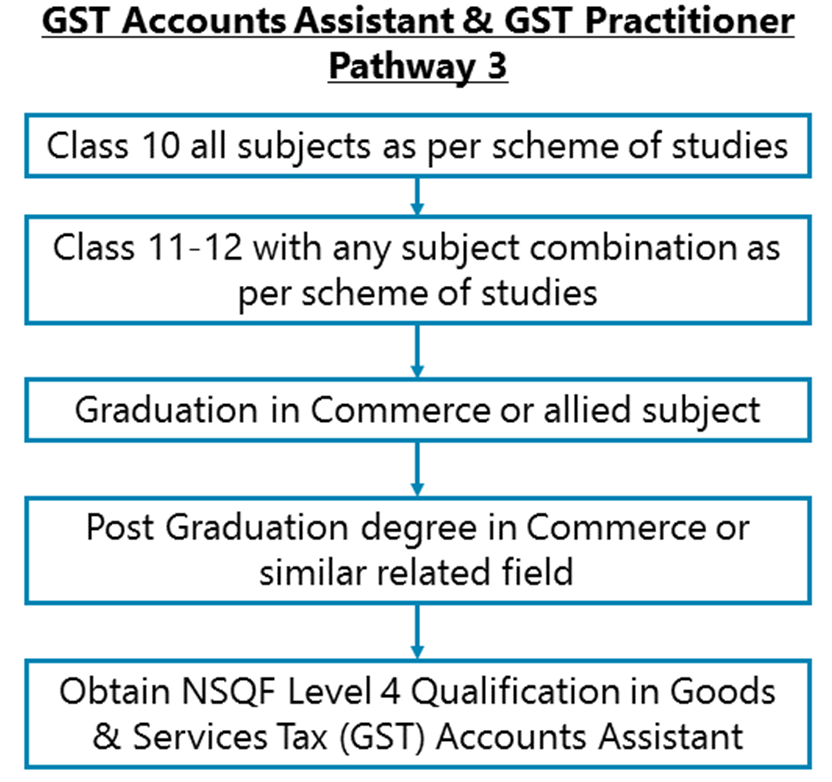
After completing Class 11-12 with any subject combination as per scheme of studies and after obtaining a graduate degree in commerce or allied subject, you may apply for a post-graduation course in commerce or a similar related field such as M.Com, MA(Economics), MA (Statistics), MBA, etc. Then you may obtain NSQF (National Skills Qualification Framework) Level 4 in Goods & Services Tax (GST) Accounts Assistant. This NSQF Level 4 qualification in GST Accounts Assistant is of 100hours of duration (i.e., 53 hours for Theoretical training + 47 hours of Practical Training).
Required Qualification & Competencies
For GST Practitioner
After completing Graduation or Post Graduation or any equivalent degree, you can apply for GST Practitioner exam registration by filling form GST PCT – 01.
However, you can also apply for GST Practitioner exam registration, if you fall under one or all the following eligibility criteria:
1. One who has passed the following examinations:
2. Final examination of the Institute of Chartered Accountants of India
3. Final examination of the Institute of Cost Accountants of India
4. Final examination of the Institute of Company Secretaries of India
For an authorized GST Practitioner: For being an authorized GST Practitioner, you need to follow the following steps:
1. On the common portal on Form GST PCT – 05, a potential client will view the lists of GSTPs.
2. The potential client then will authorize the GSTP to prepare any or all of the prescribed statements using Form GST PCT – 06.
3. If any client wants to withdraw the authorization then he or she can withdraw it by using Form GST PCT – 07.
4. Once a GST Practitioner is authorized, he or she should prepare the required statements and affix his or her digital signatures on them. They can also electronically verify them using their login credentials.
5. After furnishing the statement, a confirmation will be sought from the potential client via SMS or Email. The statement furnished by a GST Practitioner will also be available to the client on the GST Portal.
6. The client must ensure and confirm that the statement submitted by the GST Practitioner is true and correct within the provided due date. If the client fails to confirm the statement than it will be considered confirmed automatically.
7. The responsibility of the correctness in the statement which is filled by the GST Practitioner will rest with the Client.
For GST Accounts Assistant
For obtaining NSQF Level 4 qualification in GST Accounts Assistant, you need to be:
1. 21 years of age,
2. Have completed your Graduation in Commerce or allied subject,
3. Or if you have completed your Post Graduation in commerce or similar related field, then also you may obtain this Qualification certificate. However, Post-Graduation is not compulsory.
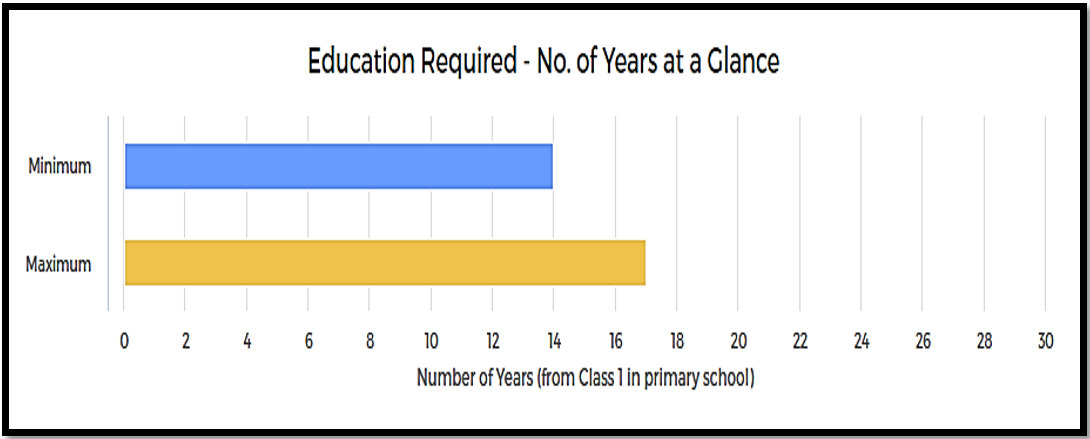
Competencies Required
Interests
Enterprising: You should have interests for Enterprising Occupations. Enterprising occupations involve taking initiatives, initiating actions, and planning to achieve goals, often business goals. These involve gathering resources and leading people to get things done. These require decision making, risk-taking, and action orientation.
Conventional: You should have interests for Conventional Occupations. Conventional occupations involve repetitive and routine tasks as well as fixed processes or procedures for getting things done. These occupations involve working more with data, systems, and procedures and less with ideas or creativity.
Knowledge
Accounting: Knowledge of various principles and methods for maintaining records of commercial and financial transactions and records, preparing various reports and statements, ensuring compliance with commercial and business laws and rules of a country, etc.
Skills
Active Learning: Focused and continuous learning from various sources of information, observation and otherwise for application in getting work done.
Coordination: Skills in working together with other people to get things done.
Judgment and Decision Making: Skills in considering the pros and cons of various decision alternatives; considering costs and benefits; taking appropriate and suitable decisions.
Problem Solving: Skills in analysis and understanding of problems, evaluating various options to solve the problems and using the best option to solve the problems.
Service Orientation: Skills in or a keen interest to help and assist people.
Time Management: Skills in prioritizing work, managing time effectively.
Abilities
Information Ordering: The ability to arrange things or actions in a certain order or pattern according to a specific rule or set of rules (e.g., patterns of numbers, letters, words, pictures, mathematical operations).
Inter-Personal: The ability to build and maintain good relationships with others at workplaces and elsewhere.
Numerical Reasoning: The ability to add, subtract, multiply, divide, and perform other basic numerical calculations correctly.
Oral Comprehension: The ability to listen to and understand information and ideas presented through spoken words and sentences.
Oral Expression: The ability to communicate information and ideas in speaking so others will understand.
Selective Attention: The ability to concentrate on a task over a long period of time without being distracted.
Speed of Closure: The ability to quickly make sense of, combine, and organize information into meaningful patterns.
Written Comprehension: The ability to read and understand information and ideas presented in writing.
Personality
1. You are always or mostly organized in your day-to-day life and activities.
2. You are always or mostly careful about your actions and behavior.
3. You are always or mostly disciplined in your actions and behavior.
4. You are always calm or generally remain calm in most situations.
5. You always feel secure in your surroundings and in most situations.
6. You can always act independently or could do so in most situations.
7. You trust others sometimes but not always.
8. You act independently sometimes but do not do so in some other times.
Career - Job Opportunities & Profiles
1. Preparing and maintaining finances or financial records is an essential part of every company, organization, and government around the world and as such job opportunities are ubiquitous. At the beginning of your career, you may find job opportunities as a junior or intern GST practitioner/GST Account Assistant.
2. You may find job opportunities in various Governments as well as private companies or organizations. Also, you may start your own GST filing center and start working independently.
Work Environment
As a GST Practitioner or GST Account Assistant, you can expect a desk job with regular hours and tightly defined responsibilities. Based on the size of the outfit you are employed with, you will often be working as a part of a large group of accountants carefully sifting through and recording copious amounts of data. Work hours may become long and unpredictable later in your career as you undertake greater responsibilities.
Career Growth
You can grow as a GST Practitioner in terms of the growth in your practice, meaning, more clients, and therefore more income.
As a GST Accounts Assistant, growth opportunity is very limited unless you move into other areas of accounting.
Salary Offered
1. Salaries vary according to job profiles and the kind of facilities you get to work at.
2. In the entry-level jobs: You may get about Rs. 5,000 – Rs. 10,000 or more per month.
Salaries increase with your work experience and as you get promoted.
1. In junior-level roles, you can expect to earn about Rs. 10,000 - 18,000 or more per month.
2. In the mid-level jobs, with 6-12 years of work experience, you may expect to get about Rs.15,000– Rs.25,000 per month or more.
3. In the senior-level jobs, with 12-15 years of work experience, you may expect to get about Rs. 25,000 – Rs.50,000 per month or even more.
4. If you are working as an Individual or independent GST Practitioner or GST accountant, then you may charge around Rs. 500 – Rs. 10,000 per GST file or even more for larger companies, depending upon the complexity of the job.
Monthly Earnings In Indian Rupee
1. Entry level: 0 - 2 years of work experience
2. Junior Level: From 1 to 12 years of work experience
3. Mid-Level: From 5 to 20+ years of work experience
4. Senior Level: From 10 to 25+ years of work experience (there could be exceptions in some high-end technical, financial, engineering, creative, management, sports, and other careers; also in the near future, people will reach these levels much faster in many careers and in some careers, these levels will have no meaning as those careers will be completely tech skill driven such as even now, there is almost no level in a Cyber Security Expert’s job)
Work Activities
As a Goods & Services Tax (GST) Accounts Assistant, you will be:
Addressing grievances and resolving conflicts: Handling complaints and grievance to resolve; resolving conflicts among co-workers or others at the workplace or outside in relation to your work.
Analyzing and interpreting data and information: Analysis of data and information to find facts, trends, reasons behind situations, etc.; interpretation of data to aid in decision making.
Calculating and computing: Calculating or computing using various mathematical formulas and functions using computers or otherwise; doing financial or commercial calculations or computations.
Communicating with co-workers and others: Communicating with people in writing, verbally or otherwise inside your workplace and various other people who have professional relationships with your place of work including vendors, government officials, etc. or with people at large.
Decision making and problem-solving: Analysis of data and information; evaluation of alternative decisions and results of decisions; taking the right decisions and solving problems.
Developing and maintaining inter-personal relationships: Developing professional relationships with co-workers and others outside organizations and maintaining good relationships.
Estimating quantity, cost, time and resources: Estimating sizes, volumes, distance, and quantity; estimating and determining the time, costs, and resources; estimating materials required to perform a task.
Getting Information and learning: Observing, hearing, reading, using computers, or otherwise obtaining information and learning from it.
Providing advice and consultation to others: Giving advice or consultation to others about various issues, conceptual matters, know-hows, scientific matters, products or services.
Scheduling tasks: Scheduling project timelines, tasks and activities.
Updating and using relevant knowledge: Keeping updated with the latest knowledge relevant to your fields of work and use of the relevant knowledge in getting things done.
Using computers for work: Using computers for day-to-day office work; using computer software for various applications in day-to-day professional work; entering data and process information; for writing.
Future Prospects
According to the latest IBEF (Indian Brand Equity Foundation) India stands as the leading sourcing destination across the world, accounting for nearly 55% global market share of the US$ 185-190 billion global services sourcing business in 2017-18. Also, India's labor force is projected to reach 160-170 million by 2020. The demand for GST Practitioner or GST Accounts Assistant is expected to rise due to the rise in the corporate sector. Also, with the initiative of ‘Startup India’ by the Government of India, the economy is expanding and thus the financial segments are also growing while keeping pace with the industry. These industries will provide enormous opportunities for GST Practitioners. Apart from this, the need to file the GST as per the government orders and to avoid the penalty of non-filing of GST the demand for GST practitioner or GST Account Assistant will increase.
Future Prospects At a Glance

